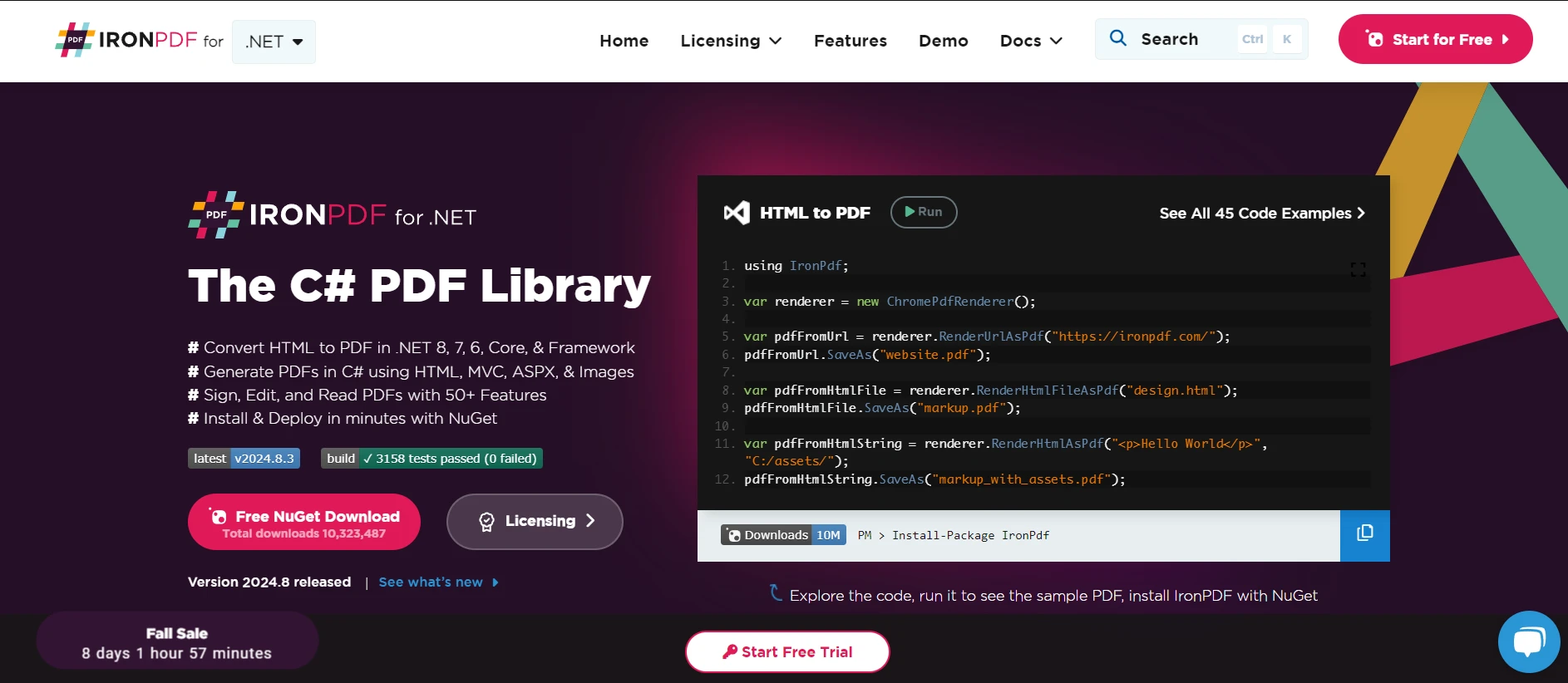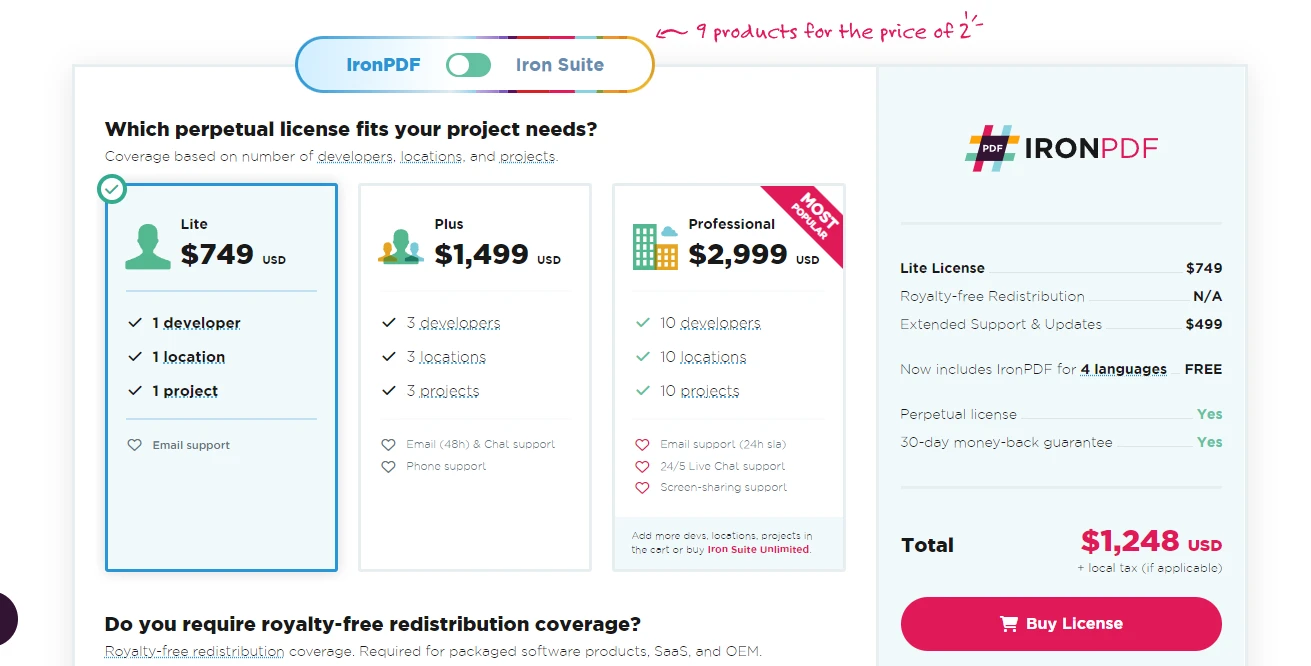Test in production without watermarks.
Works wherever you need it to.
Get 30 days of fully functional product.
Have it up and running in minutes.
Full access to our support engineering team during your product trial
Discriminated Unions, also known as tagged unions or sum types, represent a powerful tool to model data that can take different forms, but with well-defined and limited possible cases. Although C# doesn't have native discriminated unions like some other languages (e.g., F# or Rust), you can simulate discriminated unions using several techniques in the language. In this tutorial, we'll dive into discriminated unions, how to implement them in C#, and their practical use case with the IronPDF library.
In simple terms, a discriminated union is a type that can hold one of several predefined forms or values. It provides a way to create a type-safe structure that encapsulates different types or values while ensuring at compile time that only valid cases are handled.
Imagine a scenario where you want to represent the result of an operation. The operation can either succeed, returning some data or fail, returning an error message. A discriminated union would allow you to represent these two possible outcomes in a single type.
Here’s an example of how you can simulate a discriminated union in C# using a class structure:
public abstract class OperationResult<T>
{
private OperationResult() { }
public sealed class Success : OperationResult<T>
{
public T Value { get; }
public Success(T value) => Value = value;
public override string ToString() => $"Success: {Value}";
}
public sealed class Failure : OperationResult<T>
{
public string Error { get; }
public Failure(string error) => Error = error;
public override string ToString() => $"Failure: {Error}";
}
public static OperationResult<T> CreateSuccess(T value) => new Success(value);
public static OperationResult<T> CreateFailure(string error) => new Failure(error);
}public abstract class OperationResult<T>
{
private OperationResult() { }
public sealed class Success : OperationResult<T>
{
public T Value { get; }
public Success(T value) => Value = value;
public override string ToString() => $"Success: {Value}";
}
public sealed class Failure : OperationResult<T>
{
public string Error { get; }
public Failure(string error) => Error = error;
public override string ToString() => $"Failure: {Error}";
}
public static OperationResult<T> CreateSuccess(T value) => new Success(value);
public static OperationResult<T> CreateFailure(string error) => new Failure(error);
}Public MustInherit Class OperationResult(Of T)
Private Sub New()
End Sub
Public NotInheritable Class Success
Inherits OperationResult(Of T)
Public ReadOnly Property Value() As T
Public Sub New(ByVal value As T)
Me.Value = value
End Sub
Public Overrides Function ToString() As String
Return $"Success: {Value}"
End Function
End Class
Public NotInheritable Class Failure
Inherits OperationResult(Of T)
Public ReadOnly Property [Error]() As String
Public Sub New(ByVal [error] As String)
Me.Error = [error]
End Sub
Public Overrides Function ToString() As String
Return $"Failure: {[Error]}"
End Function
End Class
Public Shared Function CreateSuccess(ByVal value As T) As OperationResult(Of T)
Return New Success(value)
End Function
Public Shared Function CreateFailure(ByVal [error] As String) As OperationResult(Of T)
Return New Failure([error])
End Function
End ClassIn this example, OperationResult
C# provides powerful pattern-matching capabilities that work well with discriminated unions. Let’s extend our OperationResult
public string HandleResult(OperationResult<int> result) =>
result switch
{
OperationResult<int>.Success success => $"Operation succeeded with value: {success.Value}",
OperationResult<int>.Failure failure => $"Operation failed with error: {failure.Error}",
_ => throw new InvalidOperationException("Unexpected result type")
};public string HandleResult(OperationResult<int> result) =>
result switch
{
OperationResult<int>.Success success => $"Operation succeeded with value: {success.Value}",
OperationResult<int>.Failure failure => $"Operation failed with error: {failure.Error}",
_ => throw new InvalidOperationException("Unexpected result type")
};'INSTANT VB TODO TASK: The following 'switch expression' was not converted by Instant VB:
'public string HandleResult(OperationResult<int> result) => result switch
' {
' OperationResult<int>.Success success => $"Operation succeeded with value: {success.Value}",
' OperationResult<int>.Failure failure => $"Operation failed with error: {failure.Error}",
' _ => throw new InvalidOperationException("Unexpected result type")
' };The switch expression here handles both the Success and Failure cases of the OperationResult
You can extend the functionality of discriminated unions using extension methods. For example, let’s create an extension method for our OperationResult
public static class OperationResultExtensions
{
public static bool IsSuccess<T>(this OperationResult<T> result) =>
result is OperationResult<T>.Success;
}public static class OperationResultExtensions
{
public static bool IsSuccess<T>(this OperationResult<T> result) =>
result is OperationResult<T>.Success;
}Public Module OperationResultExtensions
<System.Runtime.CompilerServices.Extension> _
Public Function IsSuccess(Of T)(ByVal result As OperationResult(Of T)) As Boolean
Return TypeOf result Is OperationResult(Of T).Success
End Function
End ModuleThis public static bool method checks if the result is an instance of the Success case.
C# does not have native support for discriminated unions like some other languages, but there are ongoing discussions in the community about adding such a feature. Native discriminated unions would make it easier to define and work with union types without needing to rely on class hierarchies.
One of the key benefits of discriminated unions is the type of safety they provide. Since all possible cases are known at compile time, the compiler can enforce that all cases are handled. This leads to fewer runtime errors and makes the code less error-prone.
For example, if you forget to handle a specific case in a switch statement, the compiler will produce an error, prompting you to address the missing case. This is especially useful when dealing with complex data structures with multiple possible cases.

IronPDF is a C# PDF library that helps developers create PDF files from HTML and allows them to modify PDF files without any hassle. When working with PDFs in C#, you can integrate IronPDF with discriminated unions to handle different scenarios when generating or processing PDF files. For example, you might have a process that either successfully generates a PDF or encounters an error. Discriminated unions allow you to model this process clearly. Let’s create a simple example where we generate a PDF using IronPDF and return the result as a discriminated union.
using IronPdf;
using System;
public abstract class PdfResult
{
private PdfResult() { }
public sealed class Success : PdfResult
{
public PdfDocument Pdf { get; }
public Success(PdfDocument pdf) => Pdf = pdf;
public override string ToString() => "PDF generation succeeded";
}
public sealed class Failure : PdfResult
{
public string ErrorMessage { get; }
public Failure(string errorMessage) => ErrorMessage = errorMessage;
public override string ToString() => $"PDF generation failed: {ErrorMessage}";
}
public static PdfResult CreateSuccess(PdfDocument pdf) => new Success(pdf);
public static PdfResult CreateFailure(string errorMessage) => new Failure(errorMessage);
}
public class PdfGenerator
{
public PdfResult GeneratePdf(string htmlContent)
{
try
{
var renderer = new ChromePdfRenderer();
var pdf = renderer.RenderHtmlAsPdf(htmlContent);
return PdfResult.CreateSuccess(pdf);
}
catch (Exception ex)
{
return PdfResult.CreateFailure(ex.Message);
}
}
}using IronPdf;
using System;
public abstract class PdfResult
{
private PdfResult() { }
public sealed class Success : PdfResult
{
public PdfDocument Pdf { get; }
public Success(PdfDocument pdf) => Pdf = pdf;
public override string ToString() => "PDF generation succeeded";
}
public sealed class Failure : PdfResult
{
public string ErrorMessage { get; }
public Failure(string errorMessage) => ErrorMessage = errorMessage;
public override string ToString() => $"PDF generation failed: {ErrorMessage}";
}
public static PdfResult CreateSuccess(PdfDocument pdf) => new Success(pdf);
public static PdfResult CreateFailure(string errorMessage) => new Failure(errorMessage);
}
public class PdfGenerator
{
public PdfResult GeneratePdf(string htmlContent)
{
try
{
var renderer = new ChromePdfRenderer();
var pdf = renderer.RenderHtmlAsPdf(htmlContent);
return PdfResult.CreateSuccess(pdf);
}
catch (Exception ex)
{
return PdfResult.CreateFailure(ex.Message);
}
}
}Imports IronPdf
Imports System
Public MustInherit Class PdfResult
Private Sub New()
End Sub
Public NotInheritable Class Success
Inherits PdfResult
Public ReadOnly Property Pdf() As PdfDocument
Public Sub New(ByVal pdf As PdfDocument)
Me.Pdf = pdf
End Sub
Public Overrides Function ToString() As String
Return "PDF generation succeeded"
End Function
End Class
Public NotInheritable Class Failure
Inherits PdfResult
Public ReadOnly Property ErrorMessage() As String
Public Sub New(ByVal errorMessage As String)
Me.ErrorMessage = errorMessage
End Sub
Public Overrides Function ToString() As String
Return $"PDF generation failed: {ErrorMessage}"
End Function
End Class
Public Shared Function CreateSuccess(ByVal pdf As PdfDocument) As PdfResult
Return New Success(pdf)
End Function
Public Shared Function CreateFailure(ByVal errorMessage As String) As PdfResult
Return New Failure(errorMessage)
End Function
End Class
Public Class PdfGenerator
Public Function GeneratePdf(ByVal htmlContent As String) As PdfResult
Try
Dim renderer = New ChromePdfRenderer()
Dim pdf = renderer.RenderHtmlAsPdf(htmlContent)
Return PdfResult.CreateSuccess(pdf)
Catch ex As Exception
Return PdfResult.CreateFailure(ex.Message)
End Try
End Function
End ClassThe PdfResult class represents a discriminated union with two cases: Success and Failure. The Success case contains a PdfDocument, while the Failure case holds an error message. The GeneratePdf method takes an HTML string, attempts to generate a PDF using IronPDF, and returns the result as a PdfResult. If PDF generation succeeds, it returns the Success case with the generated PDF. If an exception occurs, it returns the Failure case with the error message.

Discriminated unions in C# provide a powerful and flexible way to model data with multiple possible cases. Although C# doesn't support discriminated unions, you can simulate them using class hierarchies, pattern matching, and other techniques. The resulting code is more type-safe, less error-prone, and easier to maintain.
IronPDF provides a free trial to help you get a feel for the software without any upfront costs. You can explore all the features and see how they align with your needs. After your trial, licenses are available starting at $749.